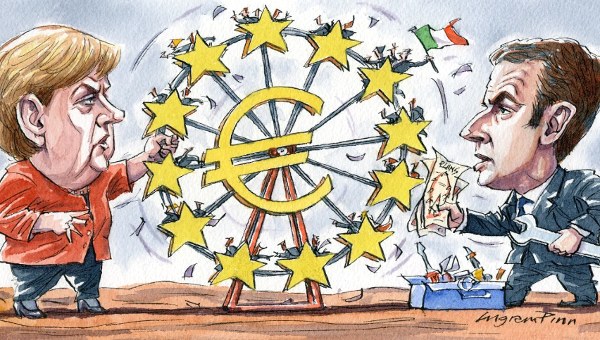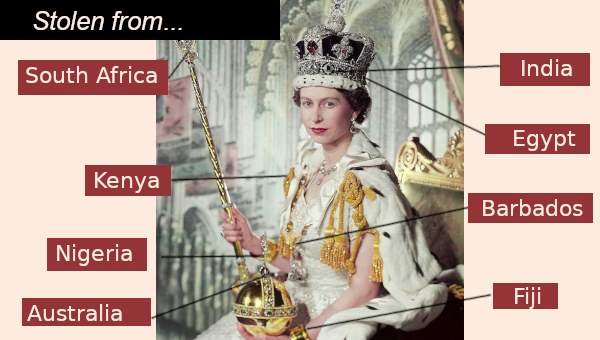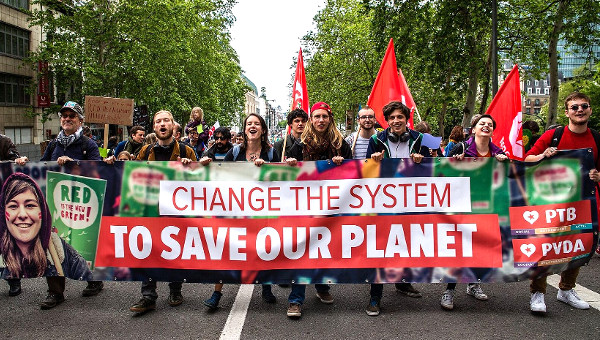Past Imperfect, Future Unknown: Europe After Brexit and the Crisis
Better Brexit than Jeremy Corbyn. This was probably the view of well-heeled Brits who would have rather remained in the EU. It was also the tenor of German media reporting on the elections to Britain’s lower-house of Parliament last November. In the run-up to the elections, Corbyn was almost continuously portrayed as a British version of Oskar Lafontaine, who in his short-lived role as economics minister in Gerhard Schroder’s first government in 1998 incurred the wrath of German and foreign media for suggesting some form of international capital controls.

After the elections the media quickly lost interest and instead consoled itself with the reality of Brexit with some schadenfreude. Much reporting dealt with the likelihood of a new referendum on Scottish independence or even about the potential unification of Northern Ireland with the Republic. This may well come to pass, but the pro-EU media have little occasion for schadenfreude. The same number of fissures running through the United Kingdom have also long been active in the European Union.
German-French Tensions
German-French relations have been broken for a while now. French President Emmanuel Macron makes proposal after proposal for the further political development of the EU while German Chancellor Angela Merkel remains silent. The choice of Ursula von der Leyens as EU Commission president and Christine Lagarde as president of the European Central Bank (ECB) seems to indicate a detente. Just as in good old times – perhaps not so good from the point of view of the smaller EU countries – the heads of government from Berlin and Paris agreed on a proposal that was adopted after much wrangling and abdominal pain.
As former Minister for War, von der Leyen fits well with Macron’s calls for an EU more independent in the realm of foreign policy and with the commensurate military build-up to support this. Lagarde earned her spurs at the head of the International Monetary Fund as a relentless advocate of austerity. It was particularly in the case of Greece where she worked in hand with the EU Commission and the ECB for a loose monetary policy and tax-financed rescues for German and French banks facing bankruptcy, but conversely cooperated in the diminution of minimal social standards and the reduction in social services.
The deal with von der Leyen and Lagarde in no way signifies a new start to the German-French relationship. In an interview with The Economist magazine in November Macron announced that NATO is brain-dead and renewed his demand for a more independent EU foreign policy. He was promptly rebuffed by Merkel.
Even prior to this the German-French partnership was in no way always the guarantor and motor of European agreement, even if this is continuously claimed in official discourse. It was rather the case that steps toward integration from the Steel and Coal Community right up to Monetary Union were always undertaken when they were compatible with the quite divergent political strategies in Berlin/Bonn and Paris. The Steel and Coal Community laid the foundations for the export-driven accumulation strategy of German capital. The German elite have held firm to this strategy to this day, as well as to its steadfast loyalty to the USA.
Yet French elites didn’t exactly have such an outcome in mind. They have always remained unclear with whom they want to enter into a foreign policy alliance, either without or even in opposition to the United States. For this they have continuously exhibited a preference for the political regulation of capital movements. This is the reason for the recurring demand for European economic governance. The German bourgeoisie is a stranger to such notions. This may be so because it is too strongly reminded of the state-capitalist enmeshment of Kaiser Wilhelm’s Germany or of the Third Reich. But it can accommodate itself to the Guallist penchant for regulation so long as France is forced into a political corset. This was the purpose of the Maastricht Treaty in 1992 and the Fiscal Pact in 2011.
The Monetary Union Powder Keg
Monetary union was nearly choked by this corset. Its resuscitation in the course of the Euro crisis has massively increased social and political tensions within the eurozone but also in the wider EU. This applies also for the uplift given to the United Kingdom Independence Party (UKIP), without which there would not have been Brexit. Both have their source in British bank-rescue and austerity policies outside of the monetary union. However, the “Speak German” position that Merkel and former finance minister Wolfgang Schäuble implemented toward the Southern-European eurozone countries has certainly also contributed to the Euro-scepticism in Great Britain. Even in Germany, whose political elite liken themselves as the defenders of German savers and taxpayers, these policies were the impetus for the foundation of the far-right party Alternative for Germany (AfD).
In the years preceding the Euro crisis a polarization occurred between the creditor nations of the Northwest eurozone and the debtor nations of the Southern and Eastern zone. In the course of the crisis the Eastern European elites imposed harsh austerity measures in order to maintain good relations with the centers of power in the creditor nations – thus showing that they in fact manage rather than rule their respective countries.
As resistance to austerity measures stirred across Southern Europe and protracted debt-rescheduling negotiations took place, Eastern European elites were betrayed by the fruit of their hasty obedience. Far-right parties like the AfD, UKIP and similar forces in the creditor nations, including considerable sections of the populations, were of the opinion that Southern Europeans actually ended up being rewarded for their profligacy. In contrast, the reward for the voluntary frugalness of Northerners was withheld. At the same time Southern Europeans realized that all their protests, occupations of public spaces, strikes and occasional elections could not alter anything vis-a-vis the creditor nations. The latter were able to maintain their power but at the expense of becoming unpopular throughout Europe.
The spreading discontent in the wake of the euro crisis was directed less toward the economic elites and their well-heeled milieu than against politicians and institutions that assert and secure the power of big money. If, to start, the confidence of the population is squandered then the maintenance of control becomes problematic for elites. The new Right is thoroughly savouring this situation. Their appearance however has some use for the elites because it diverts a significant portion of the resentment resulting from economic and social divisions toward refugees, feminists and environmental activists as well as allowing EU institutions and centrists politicians such as Macron and Merkel to appear as quite progressive – in any case better than anyone that would come after them. And certainly not anyone like the backward-gazing comrade Corbyn.
The Left in Europe
It’s a fateful mistake for the many Europeans who are less affluent to make politics rather than the economy responsible for their pains and hardships. In the de-industrialized regions of England many people identified politics mainly with Brussels and correspondingly voted for Boris Johnson. In the not less de-industrialized Scotland the London political establishment is made responsible for hardships. Corbyn was viewed as a loose cannon by elites because beyond the questions regarding Brexit he addressed social problems in England and Scotland. The result was that with 45 per cent of the vote the pro-EU Scottish National Party (SNP) was able to scoop up 48 of the 59 Scottish seats in the British parliament. Under the first-past-the-post system with 43.6 per cent of the vote the Tories won an absolute majority in parliament and with it a clear mandate for Brexit that Johnson claimed. Among the other parties elected to parliament Labour is still the most critical of the EU. It is questionable whether Johnson could have formed a coalition government under a less archaic electoral system.
A glance toward Spain shows the difference an electoral system can make. There the Socialists and Podemos formed a minority government that is tolerated by leftwing Catalonian nationalists – admittedly an unsteady construction. Indeed, in order to place relations between Madrid and Barcelona on a new footing the government has managed a shift in priorities from the national to the social question. This way the relationships between provincial and central governments, or even EU states and institutions, can probably be better negotiated than, the other way around, as in the case of Brexit. Corbyn may have led a governing coalition in Britain if there was a system of proportional representation in Britain.
As things now stand the splits that were barely contained within the Labour party in advance of the election will burst into the open. As expected the still numerous Blairites in the party are holding Corbyn’s turn to the left responsible for the electoral loss, yet the Blairites individual performances all lie below Corbyn’s 32.3 per cent of the vote; former Prime Minister Gordon Brown managed just 29 per cent in 2010 and Ed Miliband 30.4 per cent in 2015. That Brown and Miliband presided over more seats in parliament is due precisely to the pluralities of first-past-the-post.
Yet a new generation of party activists has come into existence under Corbyn’s leadership that is better at organizing and mobilizing at street level than the Blairite apparatchiks. There will be no shortage of opportunities for activists to mobilize since Johnson’s Brexit mandate is considerably weaker than he thinks or gives reason to think. No matter how he negotiates with Brussels over post-Brexit relations with the EU, someone in England, Scotland, Wales or Northern Ireland will not be happy about it. In the course of this some Johnson voters will realize that Brussels does not represent the interests of hostile nations but rather that of capital and not much different than the London political machinery. It is up to social movements from below to transform this political machinery, whether in London, Brussels or elsewhere, into bastions of social counter-power.
Postscript and the Politics of EU Paralysis
The above commentary was written for the February-issue of Sozialistische Zeitung, a journal of the German socialist movement. It argues that the fault lines in British society that ignited the Brexit-movement in the first place won’t disappear by leaving the EU. It further argues that fault lines in the EU that played in the hands of this movement in Britain still fuel anti-EU sentiment across Europe. These arguments have been confirmed by subsequent developments in European politics.
Cuts to the National Health System from Thatcher to Cameron are one of the reasons Britain is particularly hard hit by the Corona-pandemic. They also feed in to unequal access to treatment. Jeremy Corbyn who campaigned for the restoration of public healthcare and other public services like nobody since the days of Labour’s Alternative Economic Strategy in the 1970s was replaced by Keir Starmer as Labour leader. As a Blairite presented as a progressive he very much resembles Corbyn’s predecessor Ed Miliband who, contrary to media-spin, was in no way more electable than Corbyn. It is highly unlikely that a Starmer-led Labour Party will be able to galvanize street protests and parliamentary opposition into an alternative power bloc capable of challenging the Tories who are already prepping for post-lockdown austerity.
Across the Channel, paralyzing fiscal and monetary policy is business as usual. In early March, the EU Commission plans for a Green New Deal, aiming at zero greenhouse emissions by 2050, came under fire from the Polish and German governments. The Poles, governing a heavily coal-invested economy, see their economic development endangered. In a similar vein, the Germans are concerned about the energy-intensive segments of their industries. As could have been expected, they also suspect other governments of going on a spending spree in the name of green.
By the end of the March, the EU Commission quietly suspended fiscal oversight to allow member-state governments to pursue fiscal stimulus measures in the face of the corona-lockdown. Government spending on top of what was already budgeted for accumulated to 4.5 per cent of GDP in Germany. In most other eurozone countries, notably Italy and Spain, this fiscal stimulus was just, or even less than, one per cent.
One of the reasons Germany could go big easily, and thereby finance more effective measures to contain the pandemic, was that the economic crises that came with the lockdown saw investors taking refuge in safe havens, such as US treasury bills and German government bonds. This made government credit dirt cheap.
The flipside of these safe-haven investments: Europe’s debtor-countries, like Italy, Greece and Spain, that never fully recovered from the Euro-crisis, had to pay hefty risk-premiums to finance their crisis-response. Fears of a Euro-crisis redux spread as quickly as bond yields across the Eurozone diverged. With those fears demands for the creation of Euro-bonds returned but were resolutely rejected by an informal coalition of creditor-countries led by the Netherlands and supported by the usual suspects of Austria, Germany and Finland.
All that Eurozone governments could agree to was credits offered through the European Stability Mechanism, established during the last Euro-crisis outbreak and with structural adjustment strings attached to it. As with that crisis, it was left to the ECB to save the Eurozone, and with it the EU as a whole, from falling apart. Quantitative easing of unprecedented scale and scope, including central bank sales of Greek government bonds, couldn’t stop the recession that became inevitable as soon as the lockdown interrupted supply chains. But, in concert with similar measures by other central banks, it could prevent the collapse of financial circulation. But to do this the ECB ignored the monetarist rulebook around which it was constructed.
It didn’t take the German supreme court very long to denounce ECB rule-breaking. The ruling of a national supreme court doesn’t have a direct effect on a supranational body like the ECB but it does erect further barriers against the emergence of a less divisive set of monetary and fiscal policies. Just as an aside, when Hungarian prime minister Viktor Orbán suspended parliament to rule by decree for an undetermined period of time, no legal action was attempted to stop him from breaking the rules of liberal democracy. However, the EU Commission, as it often does to kick a problem down the road, started an investigation. The internal crisis of the EU and the national crises of European states continue. The future is uncertain. •





